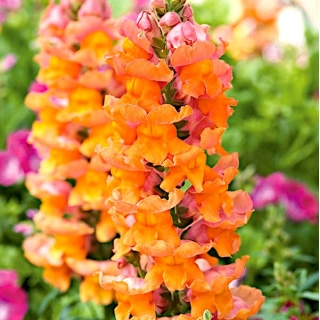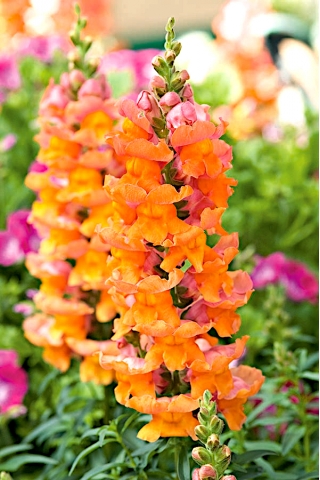The "Salmina" snapdragon (Antirrhinum majus maximum), a hybrid variety developing salmon pink flowers, is one of the most decorative varieties among the tall snapdragons, recommended for growing for cut flowers. This magnificent annual plant produces erect flower shoots growing up to 100 cm in height. These snapdragons are densely covered with foliage at the bottom and adorned in the upper part with large bilabiate flowers that take on a lovely, pastel, salmon-pink colour. Due to the large size and extremely abundant flowering, "Salmina" snapdragon is intended for growing with supports. The plant develops and blooms early, which is why it is great for planting in a greenhouse and use as cut flowers in fresh bouquets. It could also grow on a border or flowerbed in a warm, sheltered garden corner.
Seeds of the "Salmina" snapdragon should be sown under covers or at home in the spring. Direct sow into the ground is also possible, but plants grown this way bloom later. Tall snapdragons grown from seedlings produce flowers from June to September. Due to an erect habit, this species looks fantastic in the background of floral compositions, in a large single-variety group or in combination with amaranth, burgundy and multi-coloured snapdragon varieties. Summer flowers with large inflorescences, e.g. asters, marigolds, zinnias, cosmoses and sneezeweeds, will also harmonize with your snapdragons.
One package contains 0.1 g of "Salmina" salmon pink snapdragon seeds. The sow-by date and growing instructions have been printed on the back of the package.- Weight: 0.1 g
- Height: 100 cm
- Use: Ornamental - cut flower, flower beds
- Flowering period: June - September
- Growth form: erect, needs supports
- Flower colour: salmon pink
- Vegetation form: annual
- Flower type: bilabiate, large flowers, gathered in large clusters
GardenSeedsMarket - has been in business for more than a decade and from the very beginning we have made the quality of our products the top priority. Throughout the years we have delivered the best quality goods to tens of thousands of customers from all over the world. Their satisfaction proves that we had chosen the right way.
All seeds we sell are subject to a multi-level quality control checks and only then are carefully packed and dispatched. Our products have been awarded numerous certificates and comply with the highest standards of the European Union. Our employees are experienced gardeners who are more than happy to answer your every question.
Where do our seeds come from?
All of the seeds sold in our shop come from the best producers from across the European Union. Thanks to a long-standing cooperation with them we were able to develop the most adequate storing and dispatch conditions, guaranteeing that you always receive fresh and carefully tested batches of seeds. Exclusion of the middlemen from the whole process not only makes it possible for us to avoid sending out-of-date seeds that might have been lying too long on a warehouse shelf, but also ensures the most attractive price for top quality products.
The quality control process
All our seeds must pass a four-stage quality control process.
Stage one begins with a careful selection of the suppliers. Than we proceed with controlling their crops, foreign producers are not excluded from the quality control process. Plants are checked at every stage of their development: when they start to grow, during blooming and when they start bearing fruit (seeds). At this stage the most important thing is to ensure proper spacing of the plants. Thanks to that obtaining the desired morphological characteristics of each particular species or variety, such as colour, height and shape, can be ensured.
Stage two consists of a detailed verification tests in laboratory conditions. With the use of the highest quality equipment by the highly qualified staff, our suppliers perform more than 30 000 quality checks annually. The seeds that do not meet our requirements are subject to technological refining processes, including drying, cleaning, upgrading and testing again.
Stage three starts with sowing seeds in selected control plots. That way we obtain valuable, exact information concerning their germination that must be maintained at an appropriate level. Simultaneously, the varietal identity of each species is checked at this stage.
Stage four takes place in our warehouses and consists of eliminating seeds that have been stored for too long on our shelves and replacing them with new batches. Each package is stamped with a unique batch number and also with the sow-by-date.
All four stages combined allow us to state with confidence that the seeds we deliver comply with the highest standards and have completed all required control stages with flying colours.
Prizes and awards
The seeds we sell are widely recognized for their quality and have won many awards. Our seeds won numerous gold medals and distinctions for their high quality. The World of Flowers was also honoured for its innovative approach.
Among those awards there were: TOP INNOVATION (June 2015), GOLD MEDAL AT THE POZNAN INTERNATIONAL FAIR (2015), CONSUMER QUALITY LEADER (2014), FARMER OF THE YEAR (2014).
In addition, we have also been awarded the “IDEAL BUSINESS” certificate for two years in a row.
Germination
We are committed to selling only the highest quality seeds. Taking into consideration the efforts we make daily, please also note that plants are living organisms and their germination and growth depends on many factors, such as temperature, soil type, humidity and the frequency with that they are watered, sowing time and conditions, use of fertilizers and plant protection agents (pesticides), as well as weather and climate conditions. We provide help by sharing the accurate and up-to-date sowing and growing information, however, we cannot bear any responsibility for the plants that were not cultivated in conditions appropriate for given species.







